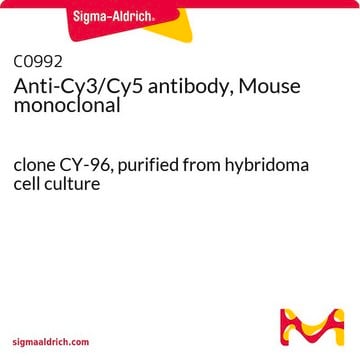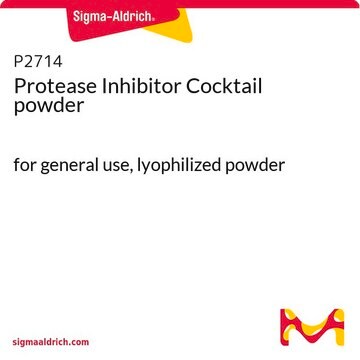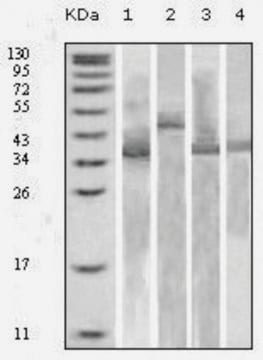推荐产品
生物源
mouse
品質等級
共軛
unconjugated
抗體表格
purified immunoglobulin
抗體產品種類
primary antibodies
無性繁殖
CY5-15, monoclonal
形狀
buffered aqueous solution
包裝
antibody small pack of 25 μL
濃度
~1.5 mg/mL
技術
direct ELISA: suitable
dot blot: 1-2 μg/mL using cell protein extracts labeled with Cy5
immunocytochemistry: suitable
immunoprecipitation (IP): suitable
microarray: suitable
同型
IgG1
運輸包裝
dry ice
儲存溫度
−20°C
目標翻譯後修改
unmodified
一般說明
CyDyes属于荧光团家族,可用于标记蛋白质、肽、DNA、RNA和其他生物分子。这些染料是小分子,对pH不敏感(在pH 3-10之间),可溶于水溶液,并且耐受DMSO。它们比荧光素更稳定,具有高摩尔消光系数和良好的量子产率。它们的物理和化学性质使其(主要是Cy3和Cy5)应用于许多不同的生物测定,例如:DNA微阵列,蛋白质微阵列,二维蛋白质分析(2D凝胶),荧光共振能量转移(FRET)和免疫组化分析。
小鼠单克隆克隆CY5-15抗Cy5抗体可识别Cy5和AlexaFluor647标记蛋白,但不识别Cy3标记蛋白。
特異性
Cy5单克隆抗体可识别Cy5和AlexaFluor647标记蛋白,但不识别Cy3标记蛋白。
该抗体可识别Cy5和AlexaFluor 647标记蛋白,但不识别Cy3标记蛋白。
免疫原
Cy5标记蛋白的混合物。
應用
小鼠单克隆克隆CY5-15抗Cy5抗体被用于标记CyDye5,用于通过免疫细胞化学和免疫组织化学(IHC)技术(如ELISA、免疫沉淀、免疫细胞化学、斑点印迹测定和蛋白质微阵列)进行检测、定量和信号放大。在使用Cy5标记生物分子的测定中,Cy5抗体是Cy5信号放大的重要工具。
小鼠抗Cy5单克隆抗体已用于免疫荧光测定和蛋白质免疫印迹。
外觀
0.01M 磷酸缓冲盐溶液,pH 7.4,含 15mM 叠氮化钠。
免責聲明
除非我们的产品目录或产品附带的其他公司文档另有说明,否则我们的产品仅供研究使用,不得用于任何其他目的,包括但不限于未经授权的商业用途、体外诊断用途、离体或体内治疗用途或任何类型的消费或应用于人类或动物。
Not finding the right product?
Try our 产品选型工具.
儲存類別代碼
12 - Non Combustible Liquids
水污染物質分類(WGK)
WGK 1
閃點(°F)
Not applicable
閃點(°C)
Not applicable
個人防護裝備
Eyeshields, Gloves, multi-purpose combination respirator cartridge (US)
Dissecting the role of COPI complexes in influenza virus infection
Sun E, et al.
Journal of Virology, 87(5), 2673-2685 (2013)
Talia D Valentini et al.
Nature communications, 11(1), 2287-2287 (2020-05-10)
Culture-independent studies of cystic fibrosis lung microbiota have provided few mechanistic insights into the polymicrobial basis of disease. Deciphering the specific contributions of individual taxa to CF pathogenesis requires comprehensive understanding of their ecophysiology at the site of infection. We
Eileen Sun et al.
Journal of virology, 87(5), 2673-2685 (2012-12-21)
As an obligate pathogen, influenza virus requires host cell factors and compartments to mediate productive infection and to produce infectious progeny virus. Recently, several small interfering RNA (siRNA) knockdown screens revealed influenza virus host dependency proteins, all of which identified
Jiang He et al.
PLoS pathogens, 9(10), e1003701-e1003701 (2013-10-17)
As an obligatory pathogen, influenza virus co-opts host cell machinery to harbor infection and to produce progeny viruses. In order to characterize the virus-host cell interactions, several genome-wide siRNA screens and proteomic analyses have been performed recently to identify host
Masaaki Kuwajima et al.
PloS one, 15(1), e0226797-e0226797 (2020-01-16)
Analysis of neuronal compartments has revealed many state-dependent changes in geometry but establishing synapse-specific mechanisms at the nanoscale has proven elusive. We co-expressed channelrhodopsin2-GFP and mAPEX2 in a subset of hippocampal CA3 neurons and used trains of light to induce
我们的科学家团队拥有各种研究领域经验,包括生命科学、材料科学、化学合成、色谱、分析及许多其他领域.
联系技术服务部门








